Item 3d-Recommendation to Amend the ECAD Ordinance to Include Small Rental Properties — original pdf
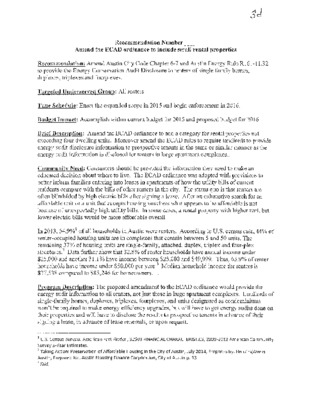
Backup

Backup
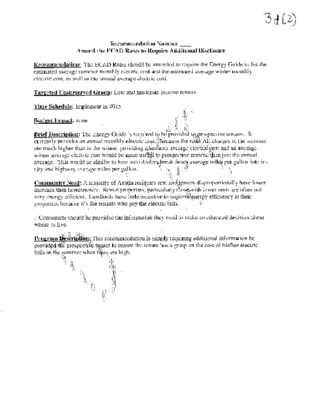
Backup
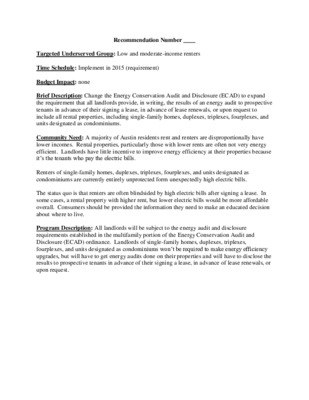
Recommendation Number ____ Targeted Underserved Group: Low and moderate-income renters Time Schedule: Implement in 2015 (requirement) Budget Impact: none Brief Description: Change the Energy Conservation Audit and Disclosure (ECAD) to expand the requirement that all landlords provide, in writing, the results of an energy audit to prospective tenants in advance of their signing a lease, in advance of lease renewals, or upon request to include all rental properties, including single-family homes, duplexes, triplexes, fourplexes, and units designated as condominiums. Community Need: A majority of Austin residents rent and renters are disproportionally have lower incomes. Rental properties, particularly those with lower rents are often not very energy efficient. Landlords have little incentive to improve energy efficiency at their properties because it’s the tenants who pay the electric bills. Renters of single-family homes, duplexes, triplexes, fourplexes, and units designated as condominiums are currently entirely unprotected form unexpectedly high electric bills. The status quo is that renters are often blindsided by high electric bills after signing a lease. In some cases, a rental property with higher rent, but lower electric bills would be more affordable overall. Consumers should be provided the information they need to make an educated decision about where to live. Program Description: All landlords will be subject to the energy audit and disclosure requirements established in the multifamily portion of the Energy Conservation Audit and Disclosure (ECAD) ordinance. Landlords of single-family homes, duplexes, triplexes, fourplexes, and units designated as condominiums won’t be required to make energy efficiency upgrades, but will have to get energy audits done on their properties and will have to disclose the results to prospective tenants in advance of their signing a lease, in advance of lease renewals, or upon request.
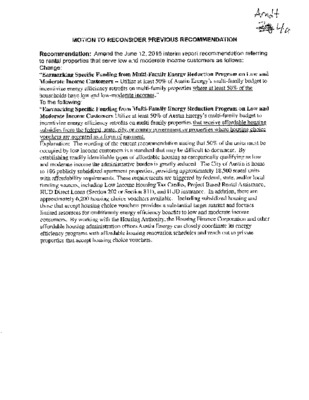
Backup
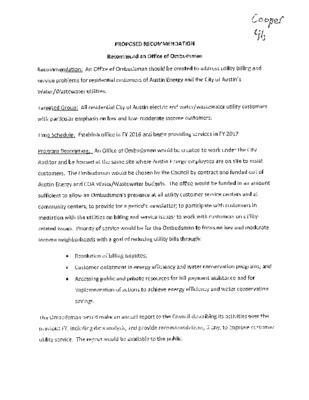
Backup
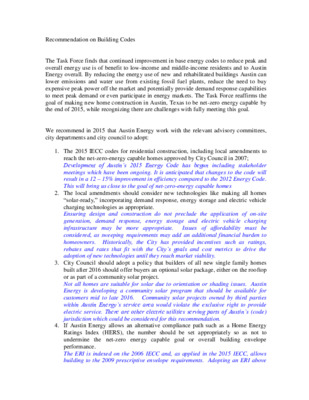
Recommendation on Building Codes The Task Force finds that continued improvement in base energy codes to reduce peak and overall energy use is of benefit to low-income and middle-income residents and to Austin Energy overall. By reducing the energy use of new and rehabilitated buildings Austin can lower emissions and water use from existing fossil fuel plants, reduce the need to buy expensive peak power off the market and potentially provide demand response capabilities to meet peak demand or even participate in energy markets. The Task Force reaffirms the goal of making new home construction in Austin, Texas to be net-zero energy capable by the end of 2015, while recognizing there are challenges with fully meeting this goal. We recommend in 2015 that Austin Energy work with the relevant advisory committees, city departments and city council to adopt: 1. The 2015 IECC codes for residential construction, including local amendments to reach the net-zero-energy capable homes approved by City Council in 2007; Development of Austin’s 2015 Energy Code has begun including stakeholder meetings which have been ongoing. It is anticipated that changes to the code will result in a 12 – 15% improvement in efficiency compared to the 2012 Energy Code. This will bring us close to the goal of net-zero-energy capable homes 2. The local amendments should consider new technologies like making all homes “solar-ready,” incorporating demand response, energy storage and electric vehicle charging technologies as appropriate. Ensuring design and construction do not preclude the application of on-site generation, demand response, energy storage and electric vehicle charging infrastructure may be more appropriate. Issues of affordability must be considered, as sweeping requirements may add an additional financial burden to homeowners. Historically, the City has provided incentives such as ratings, rebates and rates that fit with the City’s goals and cost metrics to drive the adoption of new technologies until they reach market viability. 3. City Council should adopt a policy that builders of all new single family homes built after 2016 should offer buyers an optional solar package, either on the rooftop or as part of a community solar project. Not all homes are suitable for solar due to orientation or shading issues. Austin Energy is developing a community solar program that should be available for customers mid to late 2016. Community solar projects owned by third parties within Austin Energy’s service area would violate the exclusive right to provide electric …
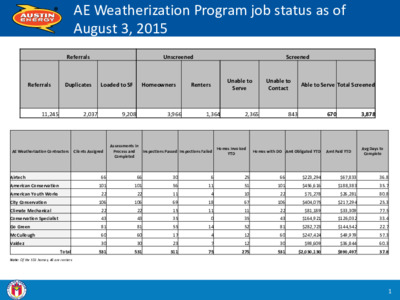
AE Weatherization Program job status as of August 3, 2015 1 Referrals Unscreened Screened Referrals Duplicates Loaded to SF Homeowners Renters Unable to Serve Unable to Contact Able to Serve Total Screened 11,245 2,037 9,208 3,966 1,364 2,365 843 670 3,878 AE Weatherization Contractors Clients Assigned Assessments in Process and Completed Inspections Passed Inspections Failed Homes Invoiced YTD Homes with DO Amt Obligated YTD Amt Paid YTD Avg Days to Complete Airtech 66 66 30 6 25 66 $223,294 $67,833 36.8 American Conservation 101 101 56 11 51 101 $456,616 $188,383 35.7 American Youth Works 22 22 11 4 10 22 $71,278 $26,281 80.8 City Conservation 106 106 69 18 67 106 $404,075 $217,294 25.3 Climate Mechanical 22 22 15 11 11 22 $81,189 $33,309 77.5 Conservation Specialist 43 43 35 0 35 43 $164,921 $126,032 33.4 Go Green 81 81 55 14 52 81 $282,723 $144,542 22.7 McCullough 60 60 17 4 12 60 $247,424 $49,979 57.3 Valdez 30 30 23 7 12 30 $98,609 $36,844 60.3 Total 531 531 311 75 275 531 $2,030,130 $890,497 37.8 Note: Of the 531 homes, 46 are renters
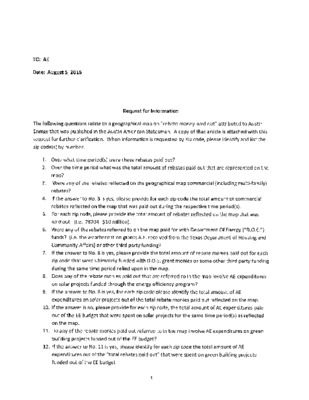
Backup
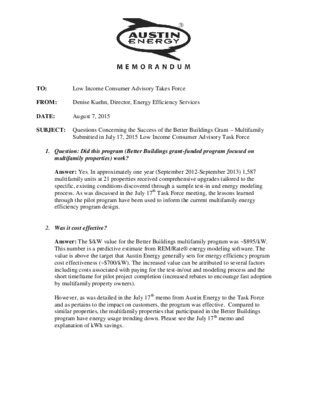
TO: Low Income Consumer Advisory Takes Force FROM: Denise Kuehn, Director, Energy Efficiency Services DATE: August 7, 2015 SUBJECT: Questions Concerning the Success of the Better Buildings Grant – Multifamily Submitted in July 17, 2015 Low Income Consumer Advisory Task Force 1. Question: Did this program (Better Buildings grant-funded program focused on multifamily properties) work? Answer: Yes. In approximately one year (September 2012-September 2013) 1,587 multifamily units at 21 properties received comprehensive upgrades tailored to the specific, existing conditions discovered through a sample test-in and energy modeling process. As was discussed in the July 17th Task Force meeting, the lessons learned through the pilot program have been used to inform the current multifamily energy efficiency program design. 2. Was it cost effective? Answer: The $/kW value for the Better Buildings multifamily program was ~$895/kW. This number is a predictive estimate from REM/Rate® energy modeling software. The value is above the target that Austin Energy generally sets for energy efficiency program cost effectiveness (~$700/kW). The increased value can be attributed to several factors including costs associated with paying for the test-in/out and modeling process and the short timeframe for pilot project completion (increased rebates to encourage fast adoption by multifamily property owners). However, as was detailed in the July 17th memo from Austin Energy to the Task Force and as pertains to the impact on customers, the program was effective. Compared to similar properties, the multifamily properties that participated in the Better Buildings program have energy usage trending down. Please see the July 17th memo and explanation of kWh savings.
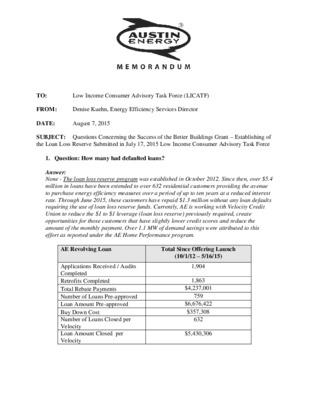
TO: Low Income Consumer Advisory Task Force (LICATF) FROM: Denise Kuehn, Energy Efficiency Services Director DATE: August 7, 2015 SUBJECT: Questions Concerning the Success of the Better Buildings Grant – Establishing of the Loan Loss Reserve Submitted in July 17, 2015 Low Income Consumer Advisory Task Force 1. Question: How many had defaulted loans? Answer: None - The loan loss reserve program was established in October 2012. Since then, over $5.4 million in loans have been extended to over 632 residential customers providing the avenue to purchase energy efficiency measures over a period of up to ten years at a reduced interest rate. Through June 2015, these customers have repaid $1.3 million without any loan defaults requiring the use of loan loss reserve funds. Currently, AE is working with Velocity Credit Union to reduce the $1 to $1 leverage (loan loss reserve) previously required, create opportunities for those customers that have slightly lower credit scores and reduce the amount of the monthly payment. Over 1.1 MW of demand savings were attributed to this effort as reported under the AE Home Performance program. AE Revolving Loan Total Since Offering Launch (10/1/12 – 5/16/15) Applications Received / Audits Completed 1,904 Retrofits Completed 1,863 Total Rebate Payments $4,237,001 Number of Loans Pre-approved 759 Loan Amount Pre-approved $6,676,422 Buy Down Cost $357,308 Number of Loans Closed per Velocity 632 Loan Amount Closed per Velocity $5,430,306
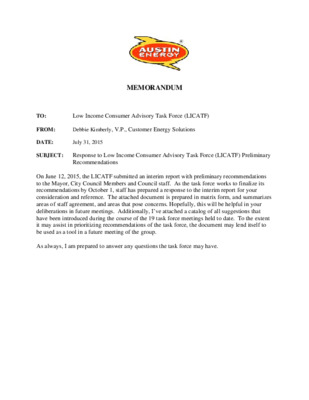
MEMORANDUM TO: Low Income Consumer Advisory Task Force (LICATF) FROM: Debbie Kimberly, V.P., Customer Energy Solutions DATE: July 31, 2015 SUBJECT: Response to Low Income Consumer Advisory Task Force (LICATF) Preliminary Recommendations On June 12, 2015, the LICATF submitted an interim report with preliminary recommendations to the Mayor, City Council Members and Council staff. As the task force works to finalize its recommendations by October 1, staff has prepared a response to the interim report for your consideration and reference. The attached document is prepared in matrix form, and summarizes areas of staff agreement, and areas that pose concerns. Hopefully, this will be helpful in your deliberations in future meetings. Additionally, I’ve attached a catalog of all suggestions that have been introduced during the course of the 19 task force meetings held to date. To the extent it may assist in prioritizing recommendations of the task force, the document may lend itself to be used as a tool in a future meeting of the group. As always, I am prepared to answer any questions the task force may have. 1 Low Income Consumer Advisory Task Force Interim Recommendations AE Response LICATF Draft Recommendations 6-12-15 Items Currently being Done and/or AE Agrees Items in Disagreement Comments/Background Carryover All Unexpended Weatherization Funds (CAP and Supplemental Weatherization (AEWX) provided via the EES tariff) AE can support this approach. In 2013, the WX contract was not in place until late in FY13; as such, CAP and AEWX funds were underspent ($1.2 MM audited). In 2014, $1.375 M was spent on CAP ($375 K over budget) and $730K on AEWX ($120K under budget). So, going into FY15, roughly $1 M in ‘cumulative carryover’ funding remained. At this writing, staff anticipates obligating $1.5 million and $.5 million in CAP and AEWX funding in FY15. Additional funds may be encumbered when new weatherization contracts are finalized. Dedicating Multi-Family (MF) Program Funds to Affordable Housing AE supports increased outreach to MF housing that is occupied by a large percentage of low income residents. AE is developing a proof of concept launch in 2016. Properties will be identified using the Guide to Affordable Housing in the Greater Austin Area. Measures will be similar to the Earmarking 50% of MF budget for low and moderate income properties is a general number without a defined basis. AE does not income qualify residents, other than for the CAP program. To do so …
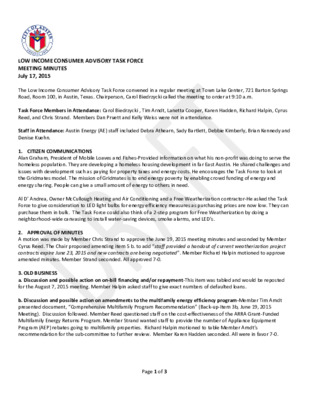
Page 1 of 3 LOW INCOME CONSUMER ADVISORY TASK FORCE MEETING MINUTES July 17, 2015 The Low Income Consumer Advisory Task Force convened in a regular meeting at Town Lake Center, 721 Barton Springs Road, Room 100, in Austin, Texas. Chairperson, Carol Biedrzycki called the meeting to order at 9:10 a.m. Task Force Members in Attendance: Carol Biedrzycki , Tim Arndt, Lanetta Cooper, Karen Hadden, Richard Halpin, Cyrus Reed, and Chris Strand. Members Dan Pruett and Kelly Weiss were not in attendance. Staff in Attendance: Austin Energy (AE) staff included Debra Athearn, Sady Bartlett, Debbie Kimberly, Brian Kennedy and Denise Kuehn. 1. CITIZEN COMMUNICATIONS Alan Graham, President of Mobile Loaves and Fishes-Provided information on what his non-profit was doing to serve the homeless population. They are developing a homeless housing development in far East Austin. He shared challenges and issues with development such as paying for property taxes and energy costs. He encourages the Task Force to look at the Gridmates model. The mission of Gridmates is to end energy poverty by enabling crowd funding of energy and energy sharing. People can give a small amount of energy to others in need. Al D’ Andrea, Owner McCullough Heating and Air Conditioning and a Free Weatherization contractor-He asked the Task Force to give consideration to LED light bulbs for energy efficiency measures as purchasing prices are now low. They can purchase them in bulk. The Task Force could also think of a 2-step program for Free Weatherization by doing a neighborhood-wide canvasing to install water-saving devices, smoke alarms, and LED’s. 2. APPROVAL OF MINUTES A motion was made by Member Chris Strand to approve the June 19, 2015 meeting minutes and seconded by Member Cyrus Reed. The Chair proposed amending item 5 b. to add “staff provided a handout of current weatherization project contracts expire June 23, 2015 and new contracts are being negotiated”. Member Richard Halpin motioned to approve amended minutes. Member Strand seconded. All approved 7-0. 3. OLD BUSINESS a. Discussion and possible action on on-bill financing and/or repayment-This item was tabled and would be reposted for the August 7, 2015 meeting. Member Halpin asked staff to give exact numbers of defaulted loans. b. Discussion and possible action on amendments to the multifamily energy efficiency program-Member Tim Arndt presented document, “Comprehensive Multifamily Program Recommendation” (Back-up-Item 3b, June 19, 2015 Meeting). Discussion followed. Member Reed questioned staff on the cost-effectiveness …
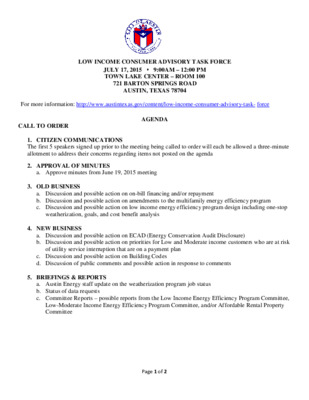
Page 1 of 2 LOW INCOME CONSUMER ADVISORY TASK FORCE JULY 17, 2015 9:00AM – 12:00 PM TOWN LAKE CENTER – ROOM 100 721 BARTON SPRINGS ROAD AUSTIN, TEXAS 78704 For more information: http://www.austintexas.gov/content/low-income-consumer-advisory-task- force AGENDA CALL TO ORDER 1. CITIZEN COMMUNICATIONS The first 5 speakers signed up prior to the meeting being called to order will each be allowed a three-minute allotment to address their concerns regarding items not posted on the agenda 2. APPROVAL OF MINUTES a. Approve minutes from June 19, 2015 meeting 3. OLD BUSINESS a. Discussion and possible action on on-bill financing and/or repayment b. Discussion and possible action on amendments to the multifamily energy efficiency program c. Discussion and possible action on low income energy efficiency program design including one-stop weatherization, goals, and cost benefit analysis 4. NEW BUSINESS a. Discussion and possible action on ECAD (Energy Conservation Audit Disclosure) b. Discussion and possible action on priorities for Low and Moderate income customers who are at risk of utility service interruption that are on a payment plan c. Discussion and possible action on Building Codes d. Discussion of public comments and possible action in response to comments 5. BRIEFINGS & REPORTS a. Austin Energy staff update on the weatherization program job status b. Status of data requests c. Committee Reports – possible reports from the Low Income Energy Efficiency Program Committee, Low-Moderate Income Energy Efficiency Program Committee, and/or Affordable Rental Property Committee Page 2 of 2 6. FUTURE AGENDA ITEMS a. Discussion regarding future agenda items including a schedule of topics and issues and topics raised during briefings and citizen communications ADJOURNMENT The City of Austin is committed to compliance with the American with Disabilities Act. Reasonable modifications and equal access to communications will be provided upon request. Meeting locations are planned with wheelchair access. If requiring Sign Language Interpreters or alternative formats, please give notice at least 2 days (48 hours) before the meeting date. Please call Sady Bartlett at Austin Energy Department, 513-322-6123, for additional information; TTY users route through Relay Texas at 711. For more information on the Low Income Consumer Advisory Task Force, please contact Sady Bartlett at 512-322-6123.
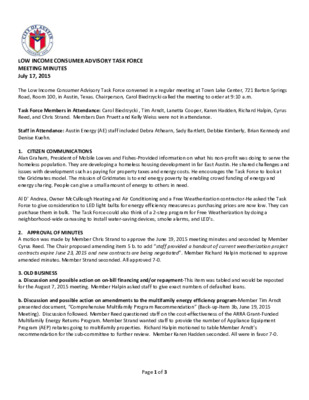
Page 1 of 3 LOW INCOME CONSUMER ADVISORY TASK FORCE MEETING MINUTES July 17, 2015 The Low Income Consumer Advisory Task Force convened in a regular meeting at Town Lake Center, 721 Barton Springs Road, Room 100, in Austin, Texas. Chairperson, Carol Biedrzycki called the meeting to order at 9:10 a.m. Task Force Members in Attendance: Carol Biedrzycki , Tim Arndt, Lanetta Cooper, Karen Hadden, Richard Halpin, Cyrus Reed, and Chris Strand. Members Dan Pruett and Kelly Weiss were not in attendance. Staff in Attendance: Austin Energy (AE) staff included Debra Athearn, Sady Bartlett, Debbie Kimberly, Brian Kennedy and Denise Kuehn. 1. CITIZEN COMMUNICATIONS Alan Graham, President of Mobile Loaves and Fishes-Provided information on what his non-profit was doing to serve the homeless population. They are developing a homeless housing development in far East Austin. He shared challenges and issues with development such as paying for property taxes and energy costs. He encourages the Task Force to look at the Gridmates model. The mission of Gridmates is to end energy poverty by enabling crowd funding of energy and energy sharing. People can give a small amount of energy to others in need. Al D’ Andrea, Owner McCullough Heating and Air Conditioning and a Free Weatherization contractor-He asked the Task Force to give consideration to LED light bulbs for energy efficiency measures as purchasing prices are now low. They can purchase them in bulk. The Task Force could also think of a 2-step program for Free Weatherization by doing a neighborhood-wide canvasing to install water-saving devices, smoke alarms, and LED’s. 2. APPROVAL OF MINUTES A motion was made by Member Chris Strand to approve the June 19, 2015 meeting minutes and seconded by Member Cyrus Reed. The Chair proposed amending item 5 b. to add “staff provided a handout of current weatherization project contracts expire June 23, 2015 and new contracts are being negotiated”. Member Richard Halpin motioned to approve amended minutes. Member Strand seconded. All approved 7-0. 3. OLD BUSINESS a. Discussion and possible action on on-bill financing and/or repayment-This item was tabled and would be reposted for the August 7, 2015 meeting. Member Halpin asked staff to give exact numbers of defaulted loans. b. Discussion and possible action on amendments to the multifamily energy efficiency program-Member Tim Arndt presented document, “Comprehensive Multifamily Program Recommendation” (Back-up-Item 3b, June 19, 2015 Meeting). Discussion followed. Member Reed questioned staff on the cost-effectiveness …
Play video
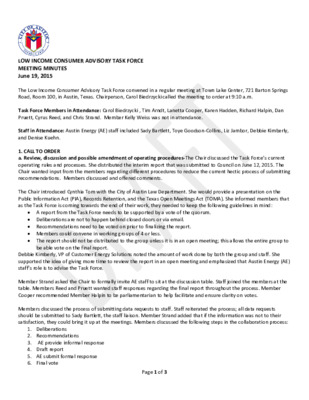
Page 1 of 3 LOW INCOME CONSUMER ADVISORY TASK FORCE MEETING MINUTES June 19, 2015 The Low Income Consumer Advisory Task Force convened in a regular meeting at Town Lake Center, 721 Barton Springs Road, Room 100, in Austin, Texas. Chairperson, Carol Biedrzycki called the meeting to order at 9:10 a.m. Task Force Members in Attendance: Carol Biedrzycki , Tim Arndt, Lanetta Cooper, Karen Hadden, Richard Halpin, Dan Pruett, Cyrus Reed, and Chris Strand. Member Kelly Weiss was not in attendance. Staff in Attendance: Austin Energy (AE) staff included Sady Bartlett, Toye Goodson-Collins, Liz Jambor, Debbie Kimberly, and Denise Kuehn. 1. CALL TO ORDER a. Review, discussion and possible amendment of operating procedures-The Chair discussed the Task Force’s current operating rules and processes. She distributed the interim report that was submitted to Council on June 12, 2015. The Chair wanted input from the members regarding different procedures to reduce the current hectic process of submitting recommendations. Members discussed and offered comments. The Chair introduced Cynthia Tom with the City of Austin Law Department. She would provide a presentation on the Public Information Act (PIA), Records Retention, and the Texas Open Meetings Act (TOMA). She informed members that as the Task Force is coming towards the end of their work, they needed to keep the following guidelines in mind: A report from the Task Force needs to be supported by a vote of the quorum. Deliberations are not to happen behind closed doors or via email. Recommendations need to be voted on prior to finalizing the report. Members could convene in working groups of 4 or less. The report should not be distributed to the group unless it is in an open meeting; this allows the entire group to be able vote on the final report. Debbie Kimberly, VP of Customer Energy Solutions noted the amount of work done by both the group and staff. She supported the idea of giving more time to review the report in an open meeting and emphasized that Austin Energy (AE) staff’s role is to advise the Task Force. Member Strand asked the Chair to formally invite AE staff to sit at the discussion table. Staff joined the members at the table. Members Reed and Pruett wanted staff responses regarding the final report throughout the process. Member Cooper recommended Member Halpin to be parliamentarian to help facilitate and ensure clarity …
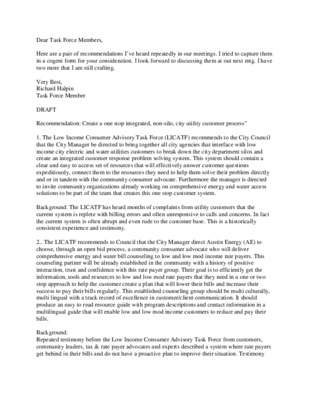
Dear Task Force Members, Here are a pair of recommendations I’ve heard repeatedly in our meetings. I tried to capture them in a cogent form for your consideration. I look forward to discussing them at out next mtg. I have two more that I am still crafting. Very Best, Richard Halpin Task Force Member DRAFT Recommendation: Create a one stop integrated, non-silo, city utility customer process” 1. The Low Income Consumer Advisory Task Force (LICATF) recommends to the City Council that the City Manager be directed to bring together all city agencies that interface with low income city electric and water utilities customers to break down the city department silos and create an integrated customer response problem solving system. This system should contain a clear and easy to access set of resources that will effectively answer customer questions expeditiously, connect them to the resources they need to help them solve their problem directly and or in tandem with the community consumer advocate. Furthermore the manager is directed to invite community organizations already working on comprehensive energy and water access solutions to be part of the team that creates this one stop customer system. Background: The LICATF has heard months of complaints from utility customers that the current system is replete with billing errors and often unresponsive to calls and concerns. In fact the current system is often abrupt and even rude to the customer base. This is a historically consistent experience and testimony. 2.. The LICATF recommends to Council that the City Manager direct Austin Energy (AE) to choose, through an open bid process, a community consumer advocate who will deliver comprehensive energy and water bill counseling to low and low mod income rate payers. This counseling partner will be already established in the community with a history of positive interaction, trust and confidence with this rate payer group. Their goal is to efficiently get the information, tools and resources to low and low mod rate payers that they need in a one or two stop approach to help the customer create a plan that will lower their bills and increase their success to pay their bills regularly. This established counseling group should be multi culturally, multi lingual with a track record of excellence in customer/client communication. It should produce an easy to read resource guide with program descriptions and contact information in a multilingual guide that will enable low …
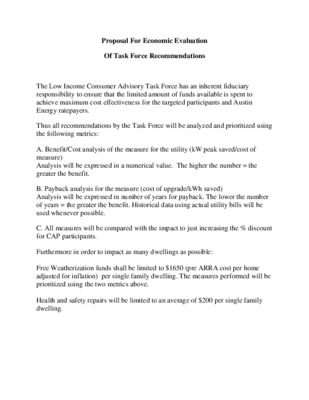
Proposal For Economic Evaluation Of Task Force Recommendations The Low Income Consumer Advisory Task Force has an inherent fiduciary responsibility to ensure that the limited amount of funds available is spent to achieve maximum cost effectiveness for the targeted participants and Austin Energy ratepayers. Thus all recommendations by the Task Force will be analyzed and prioritized using the following metrics: A. Benefit/Cost analysis of the measure for the utility (kW peak saved/cost of measure) Analysis will be expressed in a numerical value. The higher the number = the greater the benefit. B. Payback analysis for the measure (cost of upgrade/kWh saved) Analysis will be expressed in number of years for payback. The lower the number of years = the greater the benefit. Historical data using actual utility bills will be used whenever possible. C. All measures will be compared with the impact to just increasing the % discount for CAP participants. Furthermore in order to impact as many dwellings as possible: Free Weatherization funds shall be limited to $1650 (pre ARRA cost per home adjusted for inflation) per single family dwelling. The measures performed will be prioritized using the two metrics above. Health and safety repairs will be limited to an average of $200 per single family dwelling.
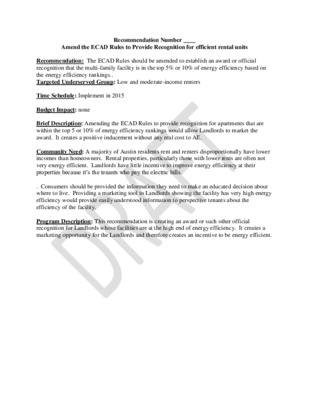
Recommendation Number ____ Amend the ECAD Rules to Provide Recognition for efficient rental units Recommendation: The ECAD Rules should be amended to establish an award or official recognition that the multi-family facility is in the top 5% or 10% of energy efficiency based on the energy efficiency rankings.. Targeted Underserved Group: Low and moderate-income renters Time Schedule: Implement in 2015 Budget Impact: none Brief Description: Amending the ECAD Rules to provide recognition for apartments that are within the top 5 or 10% of energy efficiency rankings would allow Landlords to market the award. It creates a positive inducement without any real cost to AE. Community Need: A majority of Austin residents rent and renters disproportionally have lower incomes than homeowners. Rental properties, particularly those with lower rents are often not very energy efficient. Landlords have little incentive to improve energy efficiency at their properties because it’s the tenants who pay the electric bills. . Consumers should be provided the information they need to make an educated decision about where to live. Providing a marketing tool to Landlords showing the facility has very high energy efficiency would provide easily understood information to perspective tenants about the efficiency of the facility. Program Description: This recommendation is creating an award or such other official recognition for Landlords whose facilities are at the high end of energy efficiency. It creates a marketing opportunity for the Landlords and therefore creates an incentive to be energy efficient.
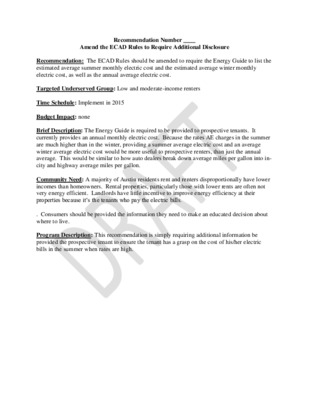
Recommendation Number ____ Amend the ECAD Rules to Require Additional Disclosure Recommendation: The ECAD Rules should be amended to require the Energy Guide to list the estimated average summer monthly electric cost and the estimated average winter monthly electric cost, as well as the annual average electric cost. Targeted Underserved Group: Low and moderate-income renters Time Schedule: Implement in 2015 Budget Impact: none Brief Description: The Energy Guide is required to be provided to prospective tenants. It currently provides an annual monthly electric cost. Because the rates AE charges in the summer are much higher than in the winter, providing a summer average electric cost and an average winter average electric cost would be more useful to prospective renters, than just the annual average. This would be similar to how auto dealers break down average miles per gallon into in-city and highway average miles per gallon. Community Need: A majority of Austin residents rent and renters disproportionally have lower incomes than homeowners. Rental properties, particularly those with lower rents are often not very energy efficient. Landlords have little incentive to improve energy efficiency at their properties because it’s the tenants who pay the electric bills. . Consumers should be provided the information they need to make an educated decision about where to live. Program Description: This recommendation is simply requiring additional information be provided the prospective tenant to ensure the tenant has a grasp on the cost of his/her electric bills in the summer when rates are high.